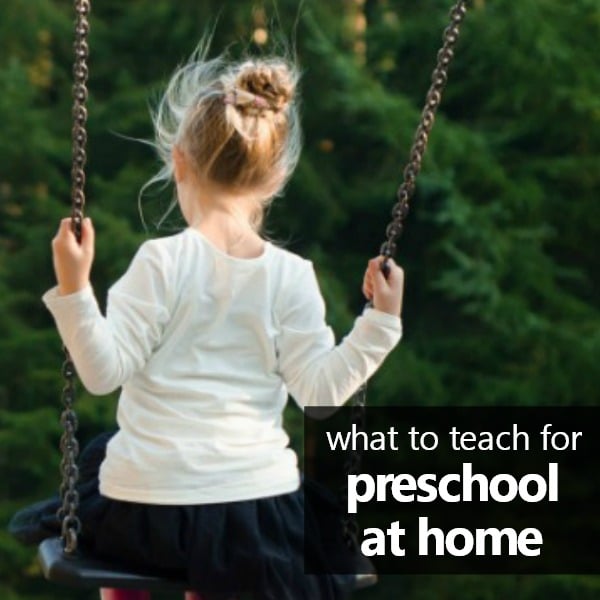Deciding what to teach during home preschool is perhaps one of the biggest challenges you’ll face when first getting started. With a little research and some brainstorming, we’ll have you more confident about what to teach in no time (well, in just a little time). In this lesson we’ll:
- take a look at some common opinions about what preschoolers should know
- examine examples of early childhood milestones
- develop some beginning goals for your learner

Opinions on Early Childhood Skills
There are many opinions about what preschoolers should be taught. In general these arguments tend to vary based on what preschoolers “need” to know vs. what many preschoolers are “capable of”. In my opinion there is a misconception that just because some preschoolers are capable of doing something early (let’s say reciting state capitals, memorizing multiplication facts, etc) that they should do it. While I have no objections to parents helping kids who are actively interested in learning about a topic achieve their goals, this becomes a problem when the parent is forcing the child. Even if the child doesn’t actively refuse, I feel the time could be spent learning more age appropriate tasks that will have a more lasting impact on children (like pretend play, story telling, and scientific exploration).
Task 1: Read the following articles about early childhood skills. Record any “aha moments” on the Toolbox pages for this section.
What a 4-Year-Old Should Know (The Huffington Post)
Kindergarten Readiness: What Your Child REALLY Needs to Be Ready (Fun-A-Day)
Why Forcing Kids to Do Things Sooner and Faster Doesn’t Get Them Further in School (The Washington Post)

Milestones for Preschool Learning
While I don’t advocate strictly following a random checklist of preschool skills, I do find that it is helpful to take a look at some of the more generally accepted checklists in order to brainstorm what skills to focus on during home preschool. Typically when reviewing these checklists I realize that my child is already practicing and working toward mastering many of the skills through day-to-day activities. This realization helps me to hone in on specific ares of strength while also identifying areas we can select as goals for the upcoming year.
Task 2: Review the milestones checklists below. Use this lesson’s free printable Toolbox pages to outline areas of strength for your child and a few goals for the upcoming year.
Developmental Milestones for Preschoolers
Worldbook Preschool Course of Study
If your child will be attending kindergarten outside of the home, it is also helpful to take a look at the kindergarten expectations for your state.
Remember that these expectations are often listed as end of year goals for kids finishing kindergarten. However, getting an idea of what will be taught during the kindergarten year can help you decide what is really a “need” for your home preschool time.
Students should enter with a general foundation for being successful on the kindergarten skills. They do not need to enter already knowing all of these skills.
So WHAT do we teach?!
How do we combine this information and decide what to focus on for home preschool? It’s likely we’ll all approach this a little differently, but this is the strategy that worked best for me.
I found it helpful to review the common milestones and my state’s kindergarten expectations (remembering that the kindergarten expectations are what a child should do at the END of kindergarten). Then I took a look at what my child was already able to do.
As I mentioned before you’ll likely find that many of the milestones are things you naturally incorporate into daily life…things like taking turns, self-care skills, and self-control, for example. By looking at what my child was already able to do, I was able to narrow down our focus for home preschool to only the skills we truly needed to devote extra time to. That doesn’t mean we weren’t focusing on the other aspects, I just didn’t plan additional activities related to them unless I felt they were an area of weakness.
You’ll also want to take into consideration your child’s age and how long you will home preschool before beginning kindergarten whether that will be at home or a school setting. Remember that doing more sooner, does not necessarily mean long-term academic gain.
While it is important to consider what you’ll be teaching I encourage you to trust your instincts. As long as you are teaching with your child’s interests in mind while using developmentally appropriate practices, you’re on the right track. Beginning goals are just that–a beginning! As you get started you’ll be able to fine tune your child’s learning path even more.
Now that you have a few goals in mind for your home preschooler we’ll start looking at activities to help teach those skills. In the next lessons in this series we’ll examine some basic preschool learning skills and get an idea of activities you can use to introduce them to your child.

Leave a Reply